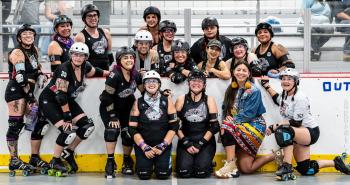Image Caption
Local Journalism Initiative Reporter
Windspeaker.com
Kristina Glass has quite a few responsibilities these days as she prepares for the Roller Derby World Cup next month. The event will be held in the Austrian city of Innsbruck from July 3 to July 6. About 50 clubs will take part.
Glass is the team manager, bench coach, skater and chair of Indigenous Rising, which includes skaters Hope Wilson from the Haida Nation in British Columbia, Hannah Cooper from NunatuKavut in Labrador and Kristine McGillivary from Opaskwayak Cree Nation in Manitoba.
The squad also includes Native American participants from the United States and Polynesian Indigenous members from Hawaii.
Glass, a member of Cherokee Nation in Oklahoma, is currently living in the southern California city of Riverside. She’s the chief spokesperson for Indigenous Rising, a non-profit collective that not only competes in roller derby events but also brings awareness to Indigenous issues, including missing and murdered Indigenous women, land rights and water rights.
“We make sure that the team is educated internally and we take that individually to our communities,” Glass said. “Each skater on the team that's competing is required to have a home team to compete with and to train with, because we don't necessarily have all of those opportunities. We’re really spread out, kind of a remote team.”
Indigenous Rising is guaranteed three matches at the World Cup. Games last one hour each.
“If we do really well, we have an opportunity for a fourth game on the final day,” Glass said.
At this point, members of Indigenous Rising only know that they will be facing Japan on July 3.
The club’s other opponents will be determined following opening day results.
“For a lot of teams, it is like derby first, community second,” Glass said. “But we really come at this with community first, derby second. We're coming to win games. But also, we feel that just being able to be there and being able to represent is a success for us. It’s a win.”
This year will mark the fourth time the Roller Derby World Cup will be staged. The last one was in 2018 in Manchester, England.
“Typically, the World Cup happens every four years,” said Glass, adding the COVID-19 pandemic delayed the running of the next event until this year.
Indigenous Rising made its World Cup debut at the 2018 event.
“That's how I found out about the team,” Glass said. “And that's when I applied to join.”
Glass, 34, joined her first roller derby club in 2009. She later co-founded California’s Rebel Town Rollers.
Some roller derby participants have colourful names. Some of the Indigenous Rising skaters are called Beast Mode, T-Rexorcist, Dream Crusher and Pow Wow Panther. Glass goes by Krispy.
“It’s a nickname from high school,” she said. “It came to me long before derby.”
Though Indigenous Rising members are keen to promote Indigenous issues when they travel to various competitions, performing well is also a key.
“Obviously we want to be as competitive as possible and to win our games,” Glass said. “That is absolutely why we're competing. We want to show up and really show our strength and what we've got and what we've been working towards, definitely, for the last two years but since the previous World Cup, since 2018.”
There has been major turnover on the squad since its first World Cup appearance.
“We have only one teammate who was at the 2018 World Cup, who will be returning this year,” Glass said. “And the rest, everyone is brand new to the world's experience or to the world stage.”
The youngest Indigenous Rising skaters are in their 20s. But the team has some members who are in their 50s.
Those on the squad are teachers, military positions, an aviation welder, death doula and a registered nurse. Some students are also on the team.
“We are bringing a very experienced team, a team with a lot of derby years under their belt,” Glass said. “But those years may not be in high-level competitive play, like on the world stage.”
Glass also said some squads that will take part in the World Cup, including Canada, the United States and Australia, are together throughout the year competing in various events.
But Indigenous Rising members don’t have that luxury.
“Typically, on non-World Cup years, we meet about three to four times a year for tournaments,” Glass said. “So, we'll get together for a weekend and have three to four games over three or four days. And then we’ll disperse and go back to our regular lives.”
The club has had some recent training sessions.
“In this last year, we've been focusing on training,” Glass added. “We had a training camp in the fall. We did that in Buffalo. And then we just wrapped our spring training camp in Arizona this May. We spent three days just practicing together, scrimmaging, doing games with the local teams.”
Indigenous Rising also took part in the No Borders Derby Tournament, which was held in February in Portland, Oregon.
More information about Indigenous Rising is available at the team website https://teamindigenous.org/

